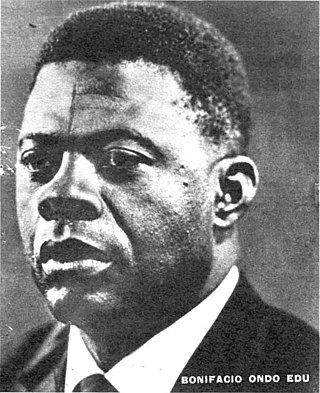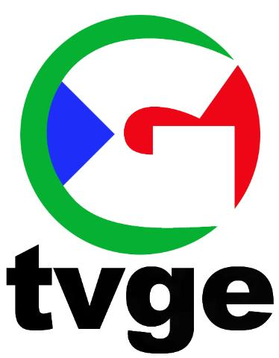
Equatorial Guinea, officially the Republic of Equatorial Guinea, is a country on the west coast of Central Africa, with an area of 28,000 square kilometres (11,000 sq mi). Formerly the colony of Spanish Guinea, its post-independence name refers to its location near both the Equator and in the African region of Guinea. As of 2024, the country had a population of 1,795,834, over 85% of whom are members of the Fang people, the country's dominant ethnic group. The Bubi people, indigenous to Bioko, are the second largest group at approximately 6.5% of the population.

The History of Equatorial Guinea is marked by centuries of colonial domination by the Portuguese, British and Spanish colonial empires, and by the local kingdoms.

The politics of Equatorial Guinea take place in a framework of a presidential republic, whereby the President is both the head of state and head of government. Executive power is exercised by the government. Legislative power is vested in both the government and the Chamber of People's Representatives

Francisco Macías Nguema, often referred to as Macías Nguema or simply Macías, was an Equatoguinean politician who served as the first president of Equatorial Guinea from the country's independence in 1968, until his overthrow in 1979. He is widely remembered as one of the most brutal dictators in history. As president, he exhibited bizarre and erratic behavior; many of his contemporaries believed he was insane.

The Democratic Party of Equatorial Guinea is the ruling political party in Equatorial Guinea. It was established by President Teodoro Obiang Nguema Mbasogo on 11 October 1987.

Bonifacio Ondó Edú-Aguong was an Equatoguinean politician who served as the Prime Minister of Equatorial Guinea from 1964 to 1968 while it was still under Spanish colonial rule, as Spanish Guinea. He played a leading role in the country's independence, and led the National Union Movement of Equatorial Guinea from 1959 until his death.

Annobón is a province of Equatorial Guinea. The province consists of the island of Annobón and its associated islets in the Gulf of Guinea. Annobón is the smallest province of Equatorial Guinea in both area and population. According to the 2015 census, Annobón had 5,314 inhabitants, a small population increase from the 5,008 registered by the 2001 census. The official language is Spanish but most of the inhabitants speak a creole form of Portuguese. The island's main industries are fishing and forestry.

The Ministry of Economy, Trade and Business (MINECO) is the department of the Government of Spain responsible for proposing and carrying out the government policy on economic affairs, through reforms to improve competitiveness and trade, focused on business support and the potential growth of the economy. At the same time, it directs the commercial policy of internationalization of companies, as well as the supervision of investments and foreign transactions.

Equatorial Guinea–Spain relations are the diplomatic relations between Equatorial Guinea and Spain. Both nations are members of the Association of Academies of the Spanish Language, Organization of Ibero-American States and the United Nations.
Ángel Masié Ntutumu was an Equatorial Guinean politician.

Florencio Mayé Elá Mangue is an Equatoguinean military leader, politician, and diplomat.
Salvador Elá Nseng Abegue was an Equatorial Guinean military leader, politician, and diplomat.

The United National Workers' Party was a political party in Equatorial Guinea. It was the only political party in the country from 1970 to 1979, during the dictatorship of Francisco Macías Nguema.
The Supreme Military Council — initially called the Military Revolutionary Council — was the ruling military junta and the de facto government of Equatorial Guinea between the 1979 coup d'état and the 1982 constitutional referendum.

Televisión de Guinea Ecuatorial is an Equatorial Guinean state television channel, which is part of the public media system called Radio Televisión de Guinea Ecuatorial (RTVGE).
The Treaty of Friendship and Cooperation between Spain and Equatorial Guinea is a bilateral treaty signed on 23 October 1980 in Madrid by the First Vice President and Commissioner of the Ministry of Foreign Affairs and International Cooperation of Equatorial Guinea, Florencio Mayé Elá and the Minister of Foreign Affairs of Spain, José Pedro Pérez-Llorca. The treaty was published in the Boletín Oficial del Estado on 27 July 1981.
The following lists events that happened during 1979 in the Republic of Equatorial Guinea.

The Ministry of Defence is a department of the Government of Equatorial Guinea responsible for military administration. It is the administrative and executive body of the Armed Forces of Equatorial Guinea. It is under the supervision of the Vice President of Equatorial Guinea in charge of National Defense and Security, Teodoro Nguema Obiang Mangue.

The Ministry of Mines and Hydrocarbons of Equatorial Guinea is the public administration body in charge of the mining industry and fossil fuels. It is based in Malabo. The current minister is Don Antonio Oburu Ondo, appointed in 2023.
Edmundo Bossio Dioko, was an Equatoguinean farmer and politician, first Vice President of Equatorial Guinea after the independence of the country. He was characterized by the defense of the interests of the Bubi sociocultural group.













